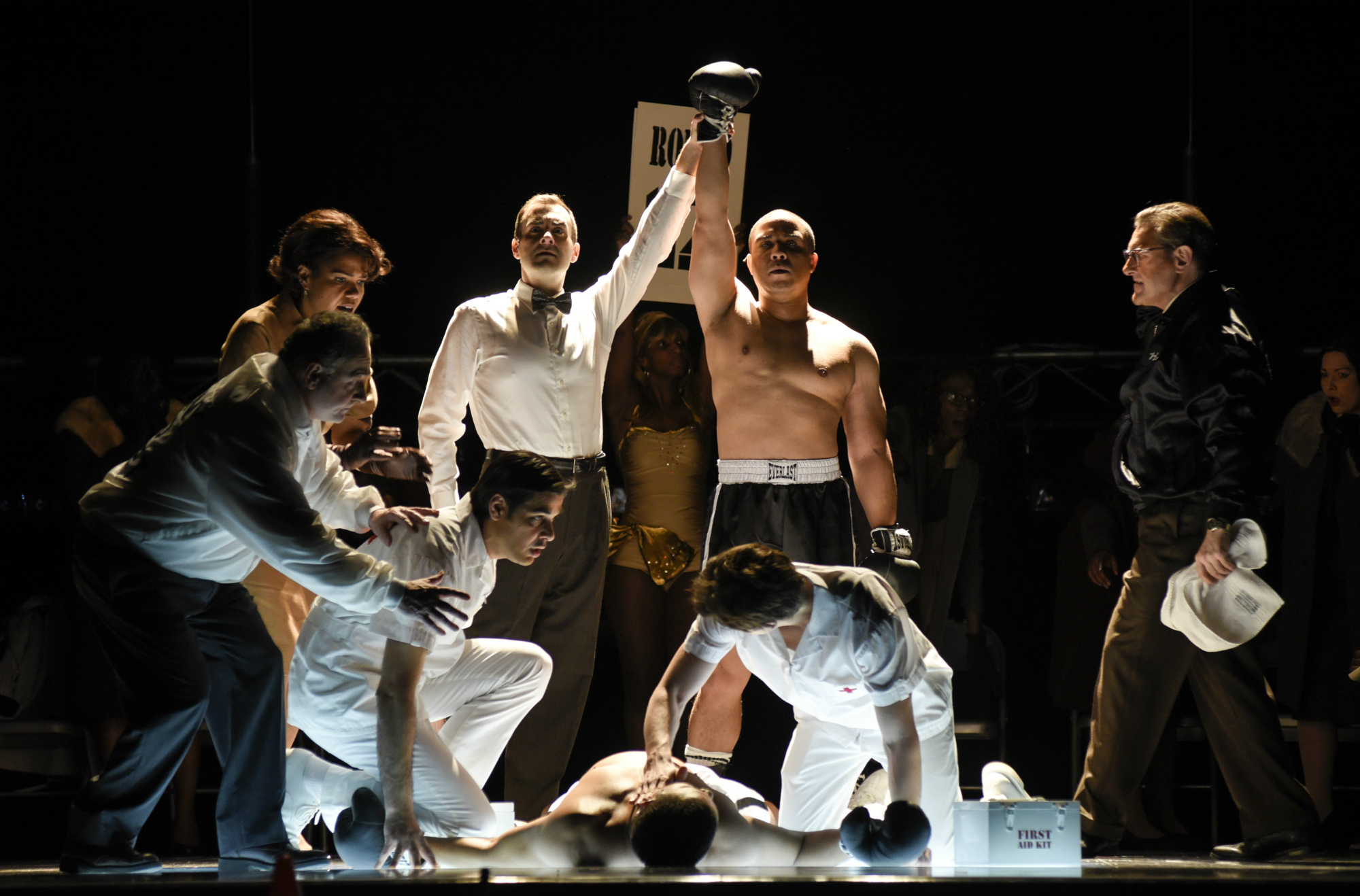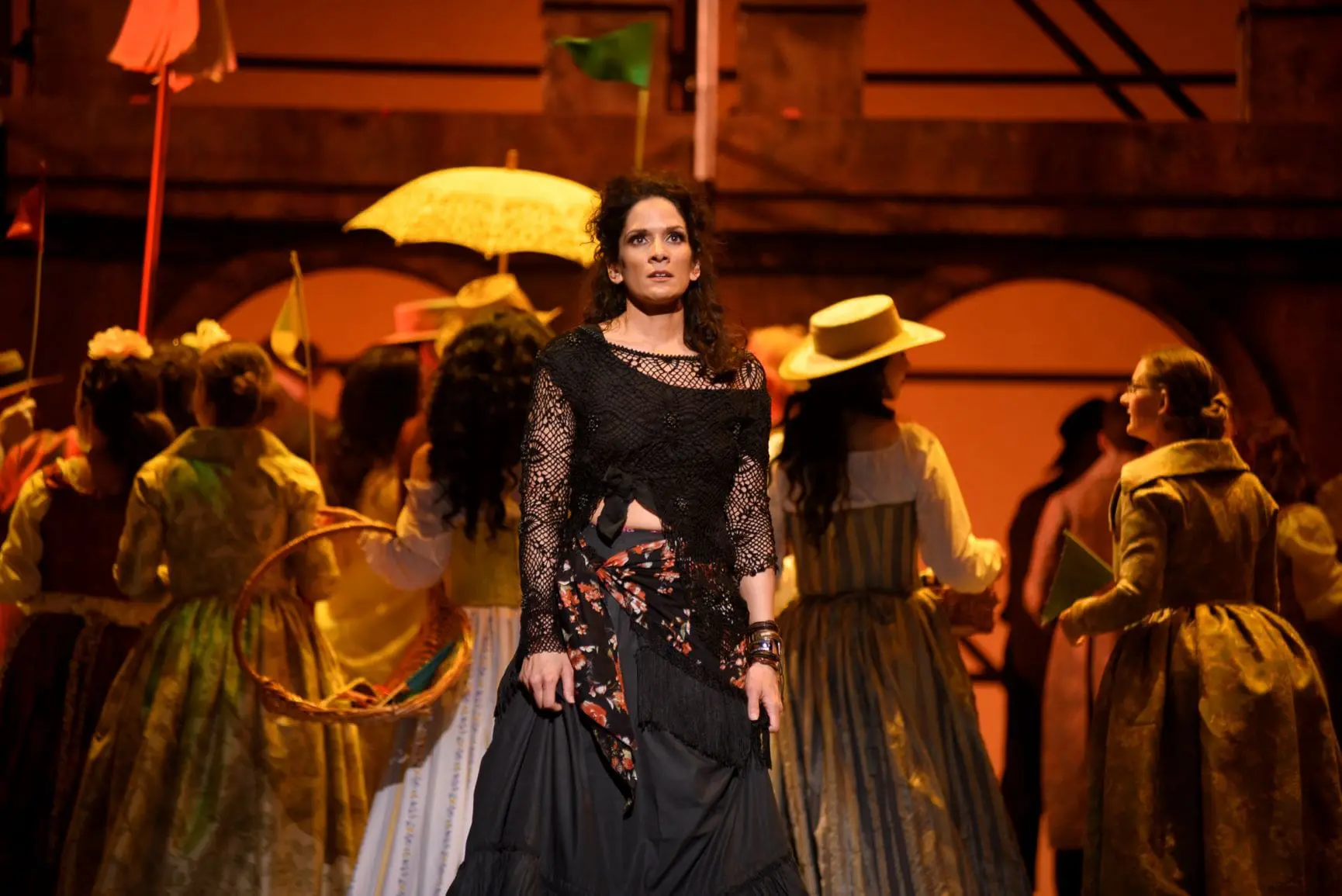Much has already been written about Champion’s musical shortcomings: its tedious repetition, its thin harmonies and watery orchestration, its dearth of satisfying emotional climaxes, its vocally awkward writing. All of these problems were at the fore in the work’s Opéra de Montréal company premiere on Jan. 26. But the dazzling talent of the cast, the warmth, colour and energy of James Robinson’s staging (from Washington National Opera), and the sheer appeal of Champion’s flawed real-life hero made this a performance worth experiencing.

Victor Ryan Robertson (Benny Paret) & Aubrey Allicock (Jeune Emile Griffith) in OdeM’s Champion. Photo: Yves Renaud
Champion tells the story of Emile Griffith, a 1960s welterweight boxing champion, who killed his rival Benny “The Kid” Paret in the ring after Paret taunted him at weigh-in with the Spanish slur for “faggot”. When we first meet him, Griffith’s fighting days are long gone. Shaky and forgetful with boxer’s dementia, he wanders the stage looking for his lost shoe. Scenes flash back to Griffith’s past: his abused boyhood in St. Thomas, Virgin Islands. His Stateside reunion with his wayward mother, who left her six other children scattered to the tradewinds. A shrewd businessman, Howie Albert, sees a sweet but tough kid “built like a brick shithouse” and turns him into a champion. Meanwhile, Emile spends his nights at a gay bar, surrounded by drag queens and pretty men. Paret’s teasing “maricon” hit too close to home. “They can forgive me for killing a man, but not for loving one,” Griffith sings.
Many members of the original cast appeared in the Montréal production. Bass Arthur Woodley was enormously compelling as the older Emile, a hulking shell of a man haunted by ghosts. As the younger Emile, silky-toned bass-baritone Aubrey Allicock hid his self-loathing under a shiny veneer of island charm and swagger. Mezzo-soprano Catherine Daniel was a force of nature as Griffith’s mother, right down to her sing-song West Indian chiding. Her long, wrenching Act II solo—superbly accompanied by jazz bassist Eric Lagacé–was the opera’s musical highlight, soaring, textural, guttural.

Asitha Tennekoon (Luis Griffith) & Arthur Woodley (Vieux Emile Griffith) in OdeM’s Champion. Photo: Yves Renaud
Tenor Asitha Tennekoon gave a sympathetic, tender portrayal of Griffith’s adopted son Luis, skillfully negotiating his part’s unkind spread. As Benny Paret, tenor Victor Ryan Robertson chewed up the scenery with his outsized, preening physicality. Baritone Brett Polegato’s Howie had something of Mickey’s gruffness from Rocky, although Polegato’s diction wasn’t always clear (a fact not helped by the often incorrect surtitles and intermittent audio issues with the soloists’ body microphones on opening night).
Chantal Nurse’s luminous soprano elevated the smaller role of Griffith’s wife Sadie, while contralto Meredith Arwady growled and sashayed her way around the role of gay bar owner Kathy Hagan with lewd gusto. Tenor Sebastian Haboczki was a suitably slick, antsy ring announcer. As the boy Emile, young treble Nathan Dibula showed remarkable poise, focus and touching fragility. Only bass-baritone Scott Brooks seemed miscast as a young man whom Emile tries to seduce, his singing never “in the pocket”, his dancing more clumsy than sexy.
Supplementing the OdeM chorus was the Montreal Jubilation Gospel Choir, prepared by the iconic Dr. Trevor Payne, who came out of retirement for the occasion. George Manahan led the Orchestre symphonique de Montréal.
Montréal is, of course, a great jazz city. It’s also a town with a long, illustrious boxing history. Representatives from both communities joined the regular OdeM crowd for Champion’s premiere, and it was fascinating to see what a truly diverse opera audience might look like. If they were hoping for a Hollywood story of redemption, they didn’t get it. Instead, Blanchard offers, in shades of blue and black, redemption’s quieter, more ambiguous sibling: self-forgiveness.
Champion continues at OdeM January 29, 31 and February 2.
For more information and tickets, click here.
















